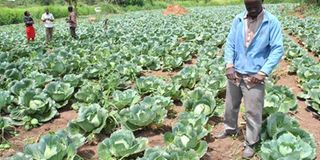How farmer schools are changing Northern Uganda

The farmers are taught proper agronomic practices such as establishing rows before planting, fertiliser application, and the selection of which crops to grow, among others. PHOTO BY STEPHEN OTAGE
Richard Opio has worked for several organisations and earned salaries but none compares to what he now earns from training farmers.
After attaining a certificate in general agriculture from Bukalasa Agricultural College, he returned to the same college for a Diploma. After that, he formed Camkwoki Farmers’ Centre.
His idea was initially to provide farmers with subsidised good quality agro inputs for better yields.
Good idea
But AVSI, an Italian NGO picked interest in his model and provided funding of Shs25m to the centre to incorporate a component of good agronomic principles and apprentice training. This attracted 90 youths who were trained in various skills in agriculture and business.
Opio says that with the training, the youth have embraced agriculture as a business. They are earning from the sale of vegetables, courtesy of AVSI and Fin-Africa which taught them how to identify markets and vet suppliers of agro-inputs.
According to Samuele Otim Riso, the programme coordinator Agri-Business Skills for You, an €8m (Shs32.7b) project is being implemented in Lango and Acholi regions. In West Nile, Zoa is implementing it under the Inter Church Cooperation run by the Dutch embassy.
He explains that the project empowers youth and women with agricultural skills. “We want to make agriculture appealing to the youth and involve women in agriculture. We work with business, technical, vocational training institutions and engaging the private sector to provide skills they need.”
Clearly defined
Riso adds this has been the missing link at school and the workplace. “Business people know the loopholes and we brought them on board to identify for the farmers the gap for the market and how they can cover that gap,” he says.
“We have agro-processors, buyers of grains from farmers, and we have the outgrowers.”
Their work is to put up a system where the actors in the value chain know their roles and they are clearly defined.
“We have an agro-processor called Opit processing maize, rice and groundnuts who thought he was working with 1,000 farmers. After setting up an outgrowers’ scheme, he realised that he was actually working with 2,500 and his out-put has tripled,” Riso cites an example.
With the outgrowers’ scheme, they train farmers to network so that as they plant their crops they have a sense of business.
When planting five acres of one food crop, they should keep in mind that one acre is for domestic consumption while the four are for the market.
AVSI has developed a curriculum where farmers are taught about high-value crops, which have ready market and attract good prices.
“Sometimes farmers plant 10 acres of maize and they do not have market, definitely they will make losses. We have some youths in Atede and Nwoya who are doing great with simple horticulture. They have bought ox-ploughs, they have built houses and this is attracting other youths into agriculture,” he says.
Santo Oyet Opio, the project’s coordinator for child protection and legal services, attributes its success to the Junior Farmer Schools. These comprise two groups per school; they are provided with tools and seeds, depending on the selected enterprises, and they are supported to manage the enterprise.
“We have facilitators who teach production, life skills and capacity development. We train them to replicate what they are learning from school at home,” Opio says.
Sebi Ali, the project manager in charge of reporting, monitoring and evaluation, adds that the project has reached a level of creating supervisory and advisory committees that follow up on the quality of training. The outreach is close to 5,000 youths who are provided with different skills.
This has encouraged the youths to utilise the skills and share the information.
As a result, the remaining link is adapting the system to the farmers by encouraging them to take up the technologies.
“Farmers are seeing the difference and they are now doing farming strategically. We have a board which evaluates the progress of the project,” he says.
Farmer’s experience
To bear testimony of the success of the project is Francis Oryema. He was previously a tomato farmer, who attended the first apprenticeship. He realised that tomato growing was a high-risk venture and switched to cabbage growing.
Oryema started by preparing the garden and selecting the right seeds, which enabled him to plant 10,000 cabbages. He projects to get between Shs8m-9m after investing capital of about Shs800,000.
“I spent Shs200,000 to rent the garden, the rest was for buying pesticides, seeds, weeding and labour,” he explains.




